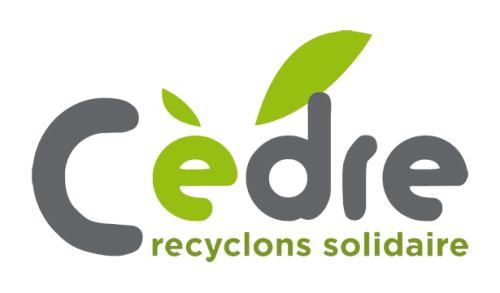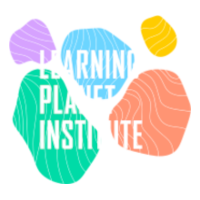
Learning Planet Institute websites
Learning Planet Institute apps
The Learning Planet Institute has the ambition to become a major actor in education for the Sustainable Development Goals (SDG's) through the pedagogical trainings offered and the projects carried out by its community. The building and its activities must also tend towards the achievement of these objectives. Taking care of the environment and the people who frequent the campus also means raising awareness of the ecological and social transition issues and learning from personal experiences to make the campus responsible.
Thus, we are implementing a series of actions to achieve these goals :
The creation of an SD&SR (Sustainable Development and Social Responsibility) roadmap is an essential tool for setting short, medium and long-term objectives and for monitoring the actions implemented. This roadmap is, in essence, transversal to all of the Learning Planet Institute's activities and aims to provide concrete responses to environmental (management of pollutant discharges, reduction of the carbon footprint, etc.) and social (internal mobility, inclusion, etc.) issues.
The challenges we face in making our activities sustainable are complex and interdependent. Yet they are vital concerns that are at the very heart of our society. It is therefore essential that everyone has the keys to understanding these concepts.
Within the Living Campus team, we want to make these concepts accessible and entertaining to all of the Learning Planet Institute' stakeholders. To do so, we organize an awareness program over several months. The essence of this program is to make people think and rethink our world through different approaches.
Each month we address different dimensions of sustainability, each month we present or think about collective and individual courses of action. To address these topics, we offer different formats : round table, workshops, games, visits in order to reach the largest number of people.
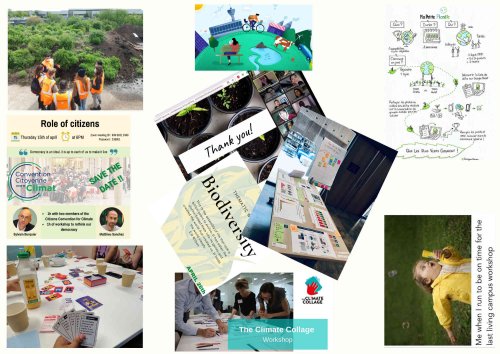
The new Learning Planet Institute campus was restored in 2018 according to the Paris Climate Plan, which defines building construction and design standards to limit greenhouse gas (GHG) emissions. However, electricity and steam consumption via the district heating network is a major source of GHG emissions (approximately 70% of our total emissions in a reference year). Our aim is therefore to reduce this emission item as much as possible by acting on several levers:
The first is to ensure that the building management system (BMS) functions correctly and that it meets the specifications transmitted at the time of delivery of the building according to HEQ (High Environmental Quality) standards. The temperature set points have been adapted accordingly as well as the lighting rules.
We also want to use the visualization of information related to our consumption to inform the building's users of the evolution of these parameters during the year and to set reduction objectives to be reached collectively.
Finally, an important lever is in the hands of the users. We believe that adopting good practices requires a good understanding of how our equipment works and the impacts of raising or lowering temperature set points or using energy-consuming equipment. Therefore, we regularly offer workshops, create signs and reminders on this subject. We also talk about all these elements during the welcome days for new Learning Planet Institute members.
Our actions, such as lowering the set temperatures on the thermostats, adapting the temperatures more precisely to the working hours, and your daily efforts, have enabled us to significantly reduce our consumption:
* 18.5% heating consumption in 2021 compared to 2019
* 9.7% of electricity consumption in 2021 compared to 2019Despite these decreases in consumption, many malfunctions still exist, specifically in our heating and lighting system, we are working with different people from the staff of the campus management, and externally to address these different aspects.
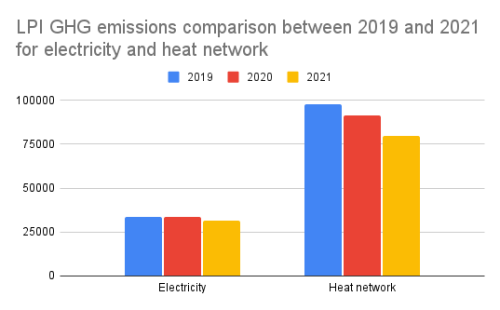
The choice of service providers and suppliers we use for our purchases and services is not neutral from an environmental and social point of view. That is why we have initiated the drafting and implementation of a responsible purchasing policy that aims to favor suppliers and service providers who are committed to reducing their negative impact on the environment as well as to improving the criteria of inclusiveness and equality within their companies.
After an inventory of Learning Planet Institute's purchasing items, we conducted a consultation with the various stakeholders to define an action plan and indicators for the proper implementation of this sustainable purchasing policy.
It was also based on a market study of the practices already in place with certain partners.
At the same time, a supplier evaluation grid has been developed and a new purchasing process has been defined, allowing, among other things, a simplified implementation of the sustainable purchasing policy.
Here are the three action sheets :
Waste sorting remains an important issue on university campus. While waste sorting has become a simple gesture that has become part of everyday life, it does not question the omnipresence of waste, and does not sufficiently aware of the collective responsibility we have to reduce the quantity of waste. At the Learning Planet Institute, a large part of our non-recyclable waste comes from individual catering, so several actions have been implemented:
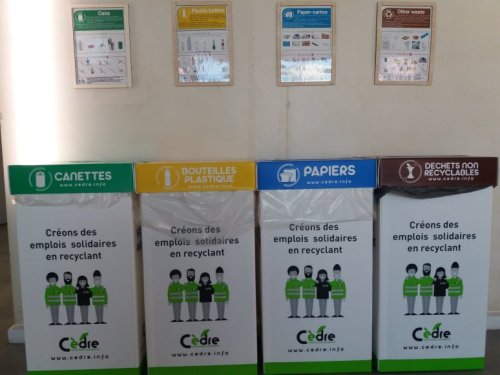
The Learning Planet Institute's reflections on its impact do not stop at the impacts of its campus, but also feed the choice of the providers we work with. Some examples:
All the furniture has been chosen from suppliers who work with products that respect environmental standards (Cradletocradle, FSC, PEFC)
An important part of the computer equipment is second-hand and supplied by the company [ECODAIR] (https://www.ecodair.org/), which allows us to considerably reduce the environmental impact of the computer park compared to new equipment. Ecodair is a company of public utility, via various structures attesting to its positive impact: Establishment of Help through Work (ESAT), Adapted Company (EA), Integration Company (EI), Integration Workshop-Chantier (ACI).
We work with the companies Cèdre and Moulinot for the collection, overhaul and recovery of waste. Moulinot is a Social Utility Company (ESUS) and an Integration Company (EI). For its part, Cèdre is an Adapted Company (EA).
The maintenance of the building is ensured thanks to a partnership between ISOR and APAIS, which employs people with disabilities. It was expressly requested that the staff in charge of maintenance work during the same time slots as the rest of the staff. All maintenance products are chosen for their low environmental impact.

